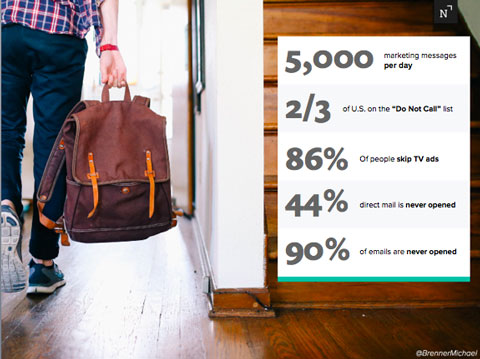US-based content marketing specialist Michael Brenner, who blogs at B2Bmarketinginsider.com, believes that "marketing has a marketing problem".
Brenner quotes a Unilever marketing exec who recently quipped at a Cannes presentation that "marketing used to be creating a myth and selling it... now it's about finding a truth and sharing it".
In the Marketing Week article, Marc Mathieu, Unilever senior vice president of marketing, was defending so-called 'native advertising' as content marketing has obliquely been called. This is his full quote: "We must make sure what we do people care about and that what we talk about does not feel alien. In the past, it was about talking at them. I have talked before about moving from a model that has been creating a myth and telling it, to finding a truth and sharing it. We need to find a model that people embrace. That's a more natural procedure. It's putting people over advertising."

And of course that is what advertising has been about for eons - weaving dreams in the ether for us to aspire to, creating a desirable lifestyle to make us want a particular brand or service, even peddling fear for certain grudge purchases like insurance.
The problem is, says Brenner, is that while the world has changed due to digital, mobile and cloud technologies, customers are tuning out ineffective marketing content. "Ask most people what they think marketing is and they will tell you it is an ad, a banner or some form of promotion. The word 'advertising' has become something that leaves some people with a bad taste in their mouth... And to some people, marketing equates to lying."
As a society, we've learned to tune marketing out and this is increasing due to all the digital distractions offered by our new social, mobile lives, says Brenner.
Brenner believes the gap created between advertising and marketing is where the opportunity lies to tell the 'right' kind of stories, not the 'stories' consumers think marketers are telling.
An interesting stat he quoted in a recent presentation is that 73% of people surveyed in a brand survey in the US, wouldn't care if the brands they use disappeared from their life. He also points to the fact that the 'disruptive' millennials - our first truly digital generation - who are now entering the marketplace, have learned to ignore the 'edges' of the internet - like banner ads.
This is the solution for brands, Brenner says: "So we have to tell them why we exist. We have to talk about our higher purpose. Our reason for being. And we have to stop talking about what we do, and start talking about what we do for our customers."
Brenner, as a content marketing go-to-guy believes storytelling will save marketing.
TwistKey's digital blog, says it is all about values and that marketers need to learn to creatively and impactfully communicate because the best marketing works because "it holds some very simple values at its core":
• People still like people: Get personal. Talk about what the brand stands for, what it does best, where they add value.
• Thinking creatively: Surprise consumers. No one is going to turn down the volume in this crowded marketplace, so brands have to work harder at standing out and being inventive.
• Walking in their shoes: Think about your consumer and the crowded environment they are in when sending out marketing messages. How receptive will they be? Are they able to hear you?
• Adding value to the client: Are you useful? Can your consumers do without your brand? Find ways to do the impossible for your clients. And then do it again.
Basically, it is about going back to basics and doing what should have been done in the first place before over-consumption and greed subverted the process. But it will be interesting to see if the jaded, over-exposed, self-obsessed consumer generation of today actually believes brands can have a 'higher purpose'. Or if they even care.

TRENDAFRiCA is a trend watching portal on consumer insight, research and trends from South Africa and further afield on the continent of Africa. It includes DAiLY trends headlines from around the world, influential Trendspotter columnists and in-depth reports on industry segments. Louise Marsland is the founder and editor.
Go to: www.trendafrica.co.za